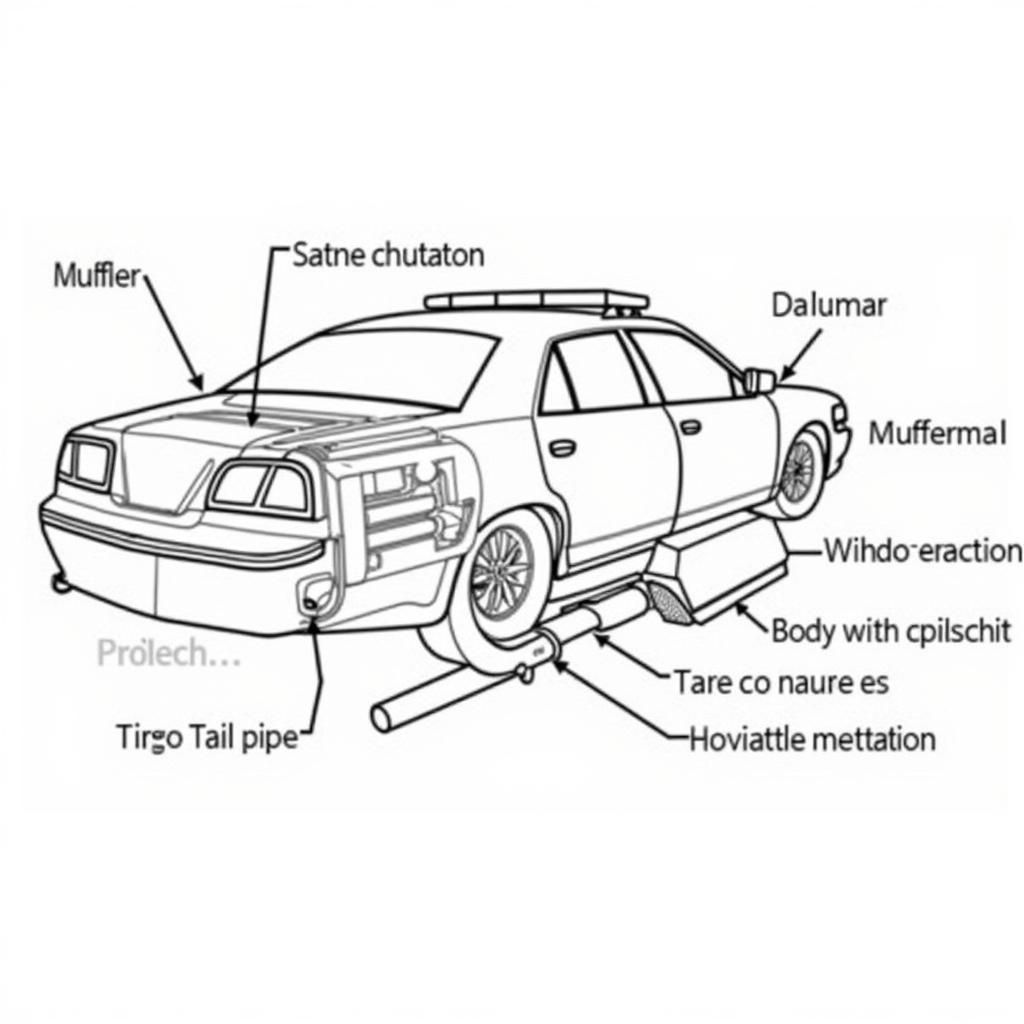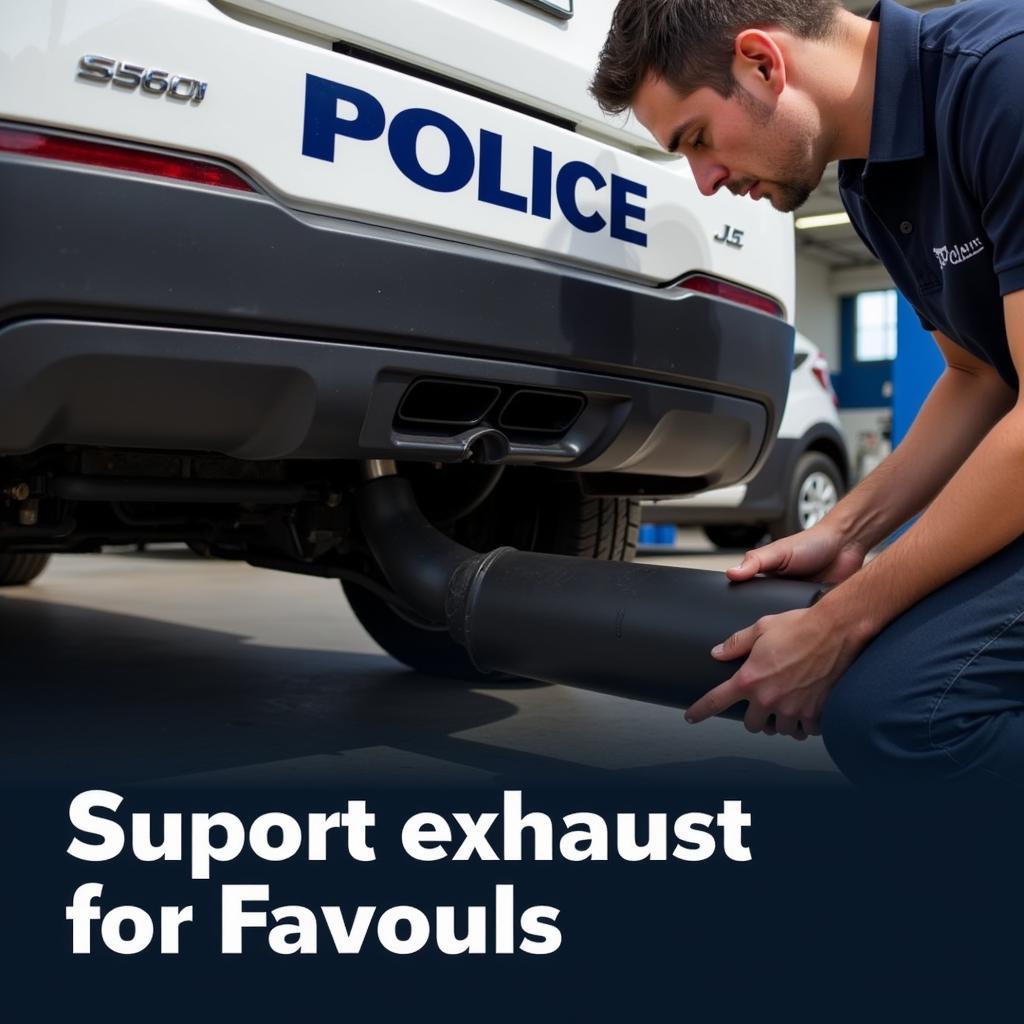Police Cars With Carbon Monoxide Problems pose a serious threat to officer safety. This article explores the causes, symptoms, prevention, and solutions for carbon monoxide leaks in police vehicles, offering crucial information for both law enforcement agencies and individual officers.
Understanding the Risks of Carbon Monoxide in Police Cars
Carbon monoxide (CO) is a colorless, odorless, and tasteless gas produced by the incomplete combustion of fuels. In police cars, the primary source is the engine exhaust. Even small leaks can lead to dangerous CO buildup, especially considering the extended periods officers spend in their vehicles.  Police Car Exhaust System Diagram
Police Car Exhaust System Diagram
Common Causes of CO Leaks in Police Vehicles
Several factors contribute to CO leaks in police vehicles. These include:
- Exhaust System Damage: Rust, cracks, or holes in the exhaust system are common culprits. Frequent idling, especially in high-crime areas, can accelerate wear and tear.
- Improper Maintenance: Neglected maintenance, such as failing to replace worn-out exhaust components, increases the risk of leaks.
- Vehicle Modifications: Aftermarket modifications, particularly to the exhaust system, can sometimes inadvertently create pathways for CO to enter the cabin.
- Idling in Enclosed Spaces: Prolonged idling in garages or other confined areas allows exhaust fumes to accumulate.
Identifying Carbon Monoxide Poisoning Symptoms
Recognizing the symptoms of CO poisoning is crucial for prompt action. Early signs can be subtle and easily dismissed, mimicking flu-like symptoms:
- Headache: Often described as a dull, persistent headache.
- Dizziness: Feeling lightheaded or unsteady.
- Nausea and Vomiting: These are common gastrointestinal responses to CO exposure.
- Weakness and Fatigue: A feeling of overwhelming tiredness.
- Confusion and Disorientation: Difficulty concentrating or thinking clearly.
Preventing Carbon Monoxide Problems: Proactive Measures
Implementing preventative measures is the best defense against CO poisoning. Here are some key strategies:
- Regular Inspections: Frequent inspections of the exhaust system, including the muffler, tailpipe, and catalytic converter, are essential.
- Prompt Repairs: Address any exhaust system issues immediately. Even small leaks can escalate into serious problems.
- Proper Ventilation: Ensure the vehicle’s ventilation system is functioning correctly and use it effectively, particularly when idling.
- CO Detectors: Install and regularly test CO detectors specifically designed for vehicles. These devices provide an early warning of dangerous CO levels.
- Avoid Idling in Enclosed Spaces: Minimize idling in enclosed areas like garages or parking structures.
Addressing Existing CO Issues: Troubleshooting and Solutions
If you suspect a CO leak, take immediate action:
- Evacuate the Vehicle: Immediately move to fresh air if you experience any CO poisoning symptoms.
- Seek Medical Attention: Even if symptoms seem mild, seek medical evaluation. CO poisoning can have long-term health consequences.
- Professional Inspection: Have a qualified mechanic thoroughly inspect the vehicle’s exhaust system and identify the source of the leak.
- Repair or Replace Damaged Components: Replace any damaged or corroded parts of the exhaust system.
“Regular inspections and prompt repairs are paramount in preventing CO issues. Don’t underestimate the dangers of this silent killer,” warns John Smith, Lead Automotive Engineer at Safe Fleet Solutions.
 Police Car Exhaust System Repair
Police Car Exhaust System Repair
Conclusion
Police cars with carbon monoxide problems present a serious risk. Understanding the causes, symptoms, and preventive measures is vital for officer safety. Regular inspections, prompt repairs, and the use of CO detectors are crucial steps in mitigating this danger. For any assistance or further inquiries, connect with AutoTipPro at +1 (641) 206-8880 or visit our office at 500 N St Mary’s St, San Antonio, TX 78205, United States.
“Investing in preventative maintenance and CO detectors is a small price to pay for the safety and well-being of our officers,” adds Jane Doe, Senior Technician at Vehicle Safety Systems Inc.




Leave a Reply